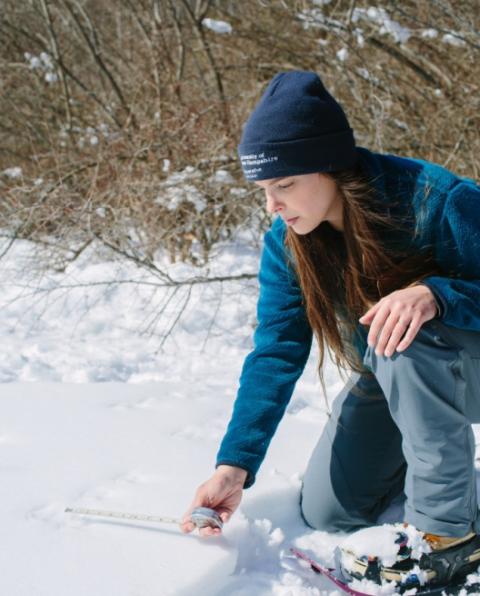
Haley Andreozzi graduated from UNH in 2013 with a master’s degree in natural resources: wildlife and conservation biology.
Haley Andreozzi: I am the wildlife outreach program manager for UNH Extension. As part of my job, I work with volunteers, landowners, natural resources professionals, communities and conservation organizations to enhance, restore and conserve wildlife habitat in the state. I provide technical assistance for outreach, citizen science and stewardship projects related to New Hampshire's wildlife species and their habitats.
As a volunteer, I am a member of the Deerfield Conservation Commission. I also volunteer as a committee member for Southeast Land Trust's Stewardship Committee.
Haley: The diversity and abundance of wildlife found in New Hampshire is, for me and many others, a large part of what makes our state special. My work is focused on helping people take positive action for New Hampshire's wildlife and the habitats that support them.
Whether I'm providing information on habitat management decisions, training volunteers in a citizen science project or guiding communities to make decisions that meet their natural resources goals, I am able to increase people’s understanding of wildlife and strengthen the connections they have to the species of New Hampshire.
Haley: My graduate experience at UNH provided me with a solid working knowledge of how natural resources are managed in New England. My research focused on the ecology and management of moose in northern New England and involved collaborating with private and public landowners, foresters and land managers, public agency staff and academic researchers.
Working with a diversity of stakeholders and audiences is a large part of my current work, which speaks to the interdisciplinary nature of wildlife and natural resources management here in New Hampshire. I appreciate my advisor, Dr. Pete Pekins, for offering the opportunity to do applied research that provided practical training in wildlife and habitat management.
Haley: For students interested in wildlife, I would suggest taking advantage of a diverse range of course work, research, and job opportunities. I pursued coursework in wildlife, forestry, soil science, wetland ecology, coastal ecosystems, and policy. My background includes applied research with small mammals, bats, brook trout and moose.
Beyond that, I also sought out work and volunteer opportunities related to outreach, working with volunteers, environmental education, and consulting. Taking an interdisciplinary approach to what I was learning and experiencing really allowed me to determine the different aspects of working in natural resources that would interest me and, ultimately, prepared me with the diverse skill set that makes me successful in my current role.
Learn More